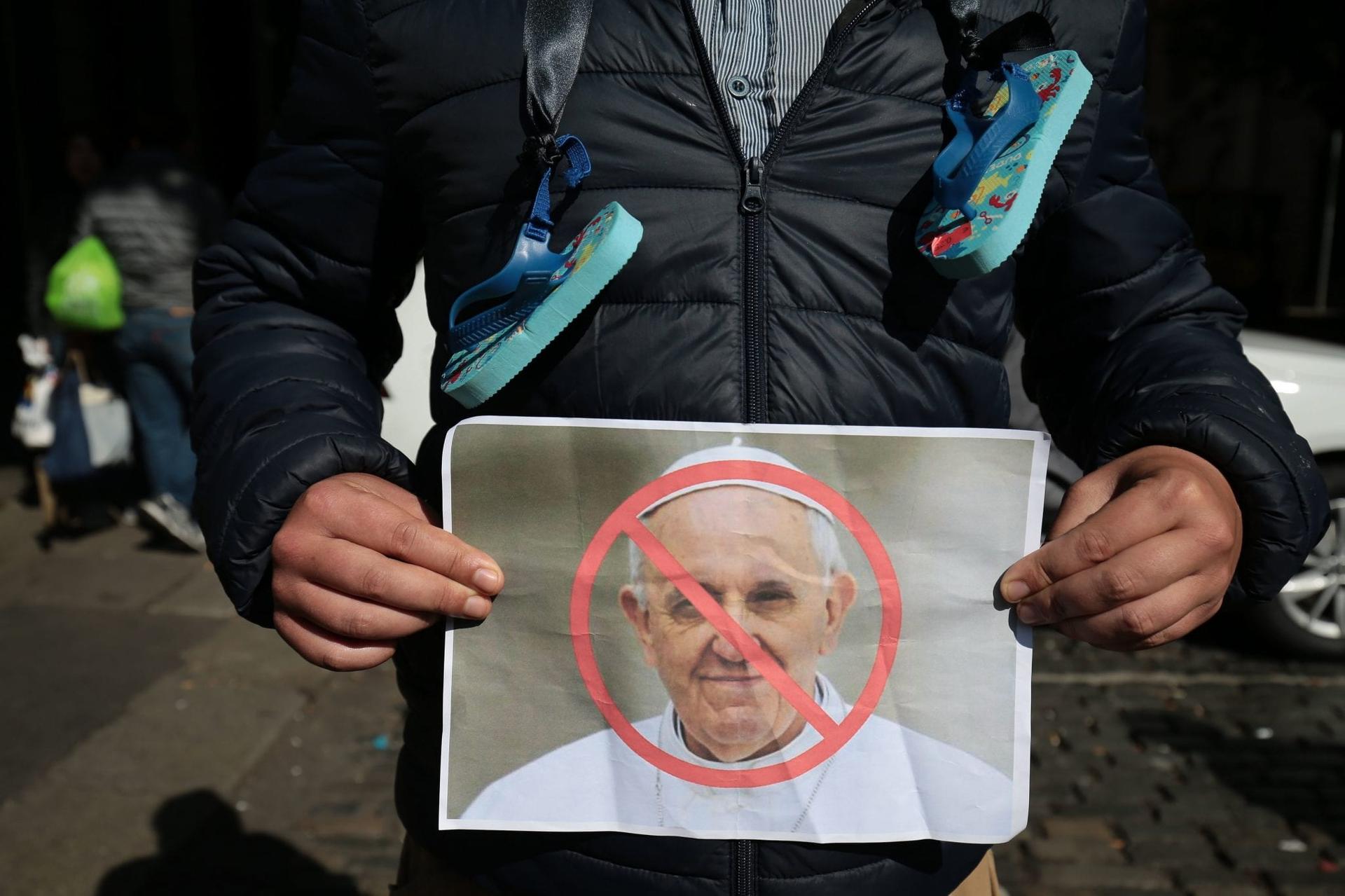ROME – Late last Sunday night, Rome got another small taste of the mounting tension between Pope Francis’s Vatican and the nationalist-populist wave cresting in Europe, as three men were arrested for putting banners on city walls accusing the pope of being a “dirty Mason” and including a reference to a neo-Nazi group called the “National Revolt.”
The 19th century risorgimento movement that resulted in the unification of Italy was, in effect, a rebellion against papal authority, and Rome’s Piazza Risorgimento on Sunday lived up to its name as it became the site of a fresh populist protest — not necessarily of the pope’s power, but of the pro-immigrant sentiment the Vatican embraces.
Three men – aged 57, 31 and 29 – were apprehended by police around 11:00 p.m. after posting signs on the Vatican wall reading “Vatican: Demon’s dung” and “Pope: dirty Mason,” making a reference to the Roman neo-Nazi group, the “National Revolt.” They also placed an upside-down cross at the site which read, “This is your symbol: pedophiles, lobbyists and immigrationists.”
It has long been a popular tradition in Rome to use city walls and statues to voice grievances against the pope. The Pasquino statue sitting near the famed Piazza Navona, for instance, is a prime example, as it has long been a site where anti-papal and anti-clerical graffiti and lamentations have been posted.
Sunday’s display was reported by local members of the “white helmets” group – a volunteer organization born in Syria and dedicated to evacuation and rescue efforts after bombings. In Italy, the organization is mostly dedicated to reporting petty crimes committed around the city.
It’s unclear exactly what crime, if any the three men will eventually be charged with, since unauthorized posting of banners generally is subject to no more than a small fine.
Although Sunday’s incident was apparently the work of a fringe group, it points to a larger issue, which is the growth in recent years of anti-papal sentiments that have accompanied the wave of nationalist and populist politics that has swept across Europe and the United States.
Francis himself has criticized populism on multiple occasions, saying during an outdoor Mass in Palermo, the capital of the Italian region of Sicily, in September 2018, that “the only possible populism” is a Christian one which “listens to and serves the people without shouting, accusing, stirring up quarrels.”
A month later, during a youth festival during the October 2018 Synod of Bishops on young people, Francis told his audience that “today populisms are fashionable, which have nothing to do with the ‘popular.’”
Popular, he said, “is the culture of the people that is expressed in art, in science, in celebration: every people celebrates in its own way,” whereas “populism is the opposite: it is a model of closure: we are closed, we are alone, and when we are closed we cannot go forward.”
Several nations opted out of the recent signing of the U.N. migration compact in Marrakesh, Morocco – an initiative the Vatican has consistently backed – on Dec. 10, many of whom, such as the United States and Italy, are led by charismatic populist leaders.
In his Jan. 7 speech to diplomats, Francis warned that international relations and the global multilateral project as a whole “are experiencing a period of difficulty, with the resurgence of nationalistic tendencies at odds with the vocation of the international organizations to be a setting for dialogue and encounter for all countries.”
Mounting tensions between European nationalist populism and the Vatican has been increasingly apparent on multiple fronts, especially when it comes to immigration, where some of the Vatican’s biggest rivals today are ironically among Europe’s most Catholic countries, such as Hungary and Poland.
Italy and the Vatican, traditionally seen as adopting the same political tone given the fact that the bulk of Italian citizens are Catholics of varying degrees, have increasingly been at odds since the election of populist leader Matteo Salvini, the country’s deputy minister and minister of the interior, who has taken a far stricter approach to immigration.
On this front, it has largely been more thoroughly secular countries, such as France or Germany, where Francis has more friends in power willing to back him on immigration and in the push for democracy and human rights.
The irony of Sunday’s incident in Rome is that even though it took place in the pope’s own backyard, and the days when the Roman Pontiff ruled over the papal states with an iron fist are long gone, people in Italy still often chafe against clerical authority.
It also confirms that public walls in the Eternal City, home for centuries to gripes against popes of all sorts, haven’t lost their relevance as a bellwether of what at least some people here are thinking and feeling.














